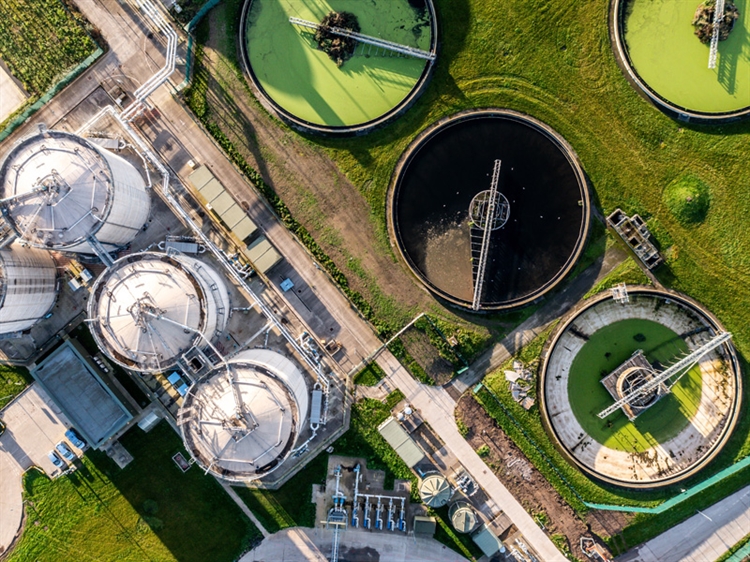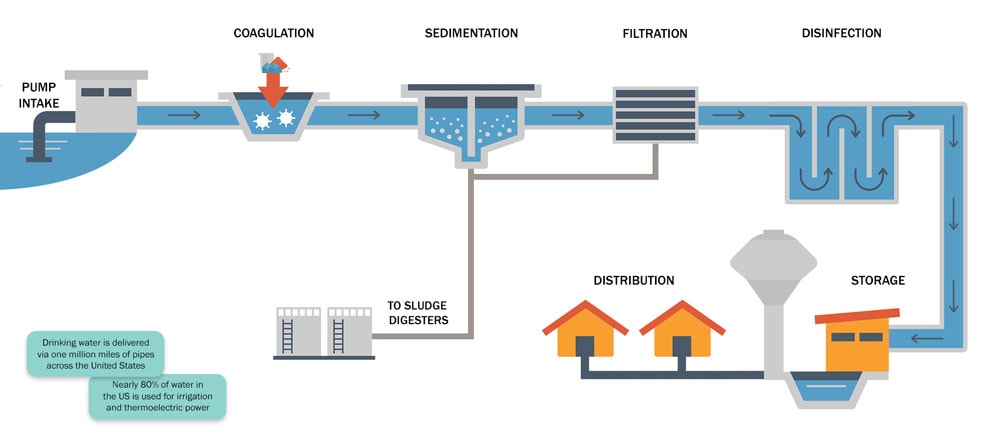Checking Out Water Technology Startups: Exactly How They Change Lasting Solutions
Water Technology start-ups are arising as essential gamers in the pursuit for lasting remedies to global water concerns. These business leverage innovative modern technologies to enhance water efficiency and monitoring. Their payments address pushing difficulties such as scarcity and contamination. Regardless of their potential, they encounter different barriers that might impact their success. Comprehending these dynamics loses light on the future of water sustainability and the role these start-ups may play in forming it.
The Significance of Water Technology in Today's Globe
As global water deficiency heightens, the relevance of water Technology ends up being increasingly evident. Water Technology plays a crucial duty in dealing with the obstacles positioned by lessening freshwater sources and raising need. It encompasses a broad array of innovations, including sophisticated purification systems, wastewater treatment innovations, and clever watering solutions. These improvements not just boost the efficiency of water use however additionally promote sustainable methods across different markets, consisting of agriculture, sector, and metropolitan growth.
Additionally, the importance of water Technology extends beyond resource administration. It fosters resilience against climate change impacts, such as floods and droughts, by providing adaptive solutions for water conservation and management. Additionally, it supports public health by making certain access to clean and risk-free drinking water. As the globe encounters growing water-related challenges, the integration of innovative water modern technologies is essential for fostering sustainable development and protecting water availability for future generations.
Innovative Solutions From Water Technology Startups
While typical strategies to water monitoring have served their objective, a brand-new wave of water technology startups is revolutionizing the sector with ingenious services (Water Technology Startups). These companies utilize sophisticated innovations to deal with pushing water problems, such as shortage, contamination, and ineffective circulation. Numerous start-ups use expert system and maker knowing to optimize water use and predict need, leading to even more sustainable practices
In addition, several companies concentrate on creating sophisticated purification systems that eliminate pollutants and make water risk-free for consumption. Others check out decentralized water therapy innovations, permitting neighborhoods to handle their water resources extra efficiently. Some startups are introducing clever irrigation options that decrease water waste in agriculture, promoting environmental preservation.
Case Researches: Effective Water Technology Startups
Many water Technology start-ups have actually arised as leaders in addressing worldwide water challenges with cutting-edge methods. One significant instance is Xylem, which concentrates on water analytics and wise framework to maximize water use and decrease waste. Their options have actually been implemented in various communities, showing substantial renovations in water monitoring performance.
An additional effective start-up, Absolutely no Mass Water, has actually developed solar-powered hydropanels that extract water vapor from the air, offering sustainable drinking water in deserts. Water Technology Startups. This Technology has actually been released in numerous nations, making certain areas have accessibility to tidy water
Last But Not Least, AquaVenture Holdings runs a varied profile of water-as-a-service remedies, resolving water deficiency via desalination and wastewater therapy. Their projects have actually confirmed essential in regions facing severe water shortages, showcasing the possibility of cutting-edge water innovations to develop long-term, favorable effects. These study highlight the transformative capacity of startups in the water Technology sector.
The Duty of Smart Technology in Water Administration
Smart Technology plays a crucial duty in contemporary water management by leveraging IoT applications to optimize resource usage. Information analytics enhances performance by supplying actionable understandings, while remote tracking remedies allow real-time oversight of water systems. With each other, these developments transform just how water is handled, advertising sustainability and functional effectiveness.
IoT Applications in Water
As water shortage and management obstacles increase worldwide, the assimilation of Web of Points (IoT) applications has actually become an essential service in maximizing water resources. IoT Technology assists in real-time surveillance and analysis of water supply, allowing more effective use and management. Sensors deployed in numerous water infrastructures can track top quality, flow prices, and leakage, providing important information to stakeholders. This information equips energies and consumers to make educated choices, reducing waste and improving conservation initiatives. In addition, smart irrigation systems use IoT to enhance water distribution for farming, guaranteeing that crops get the ideal quantity of water at the right time. Overall, IoT applications are transforming standard water monitoring practices, fostering sustainability and resilience in water resource systems.
Data Analytics for Effectiveness
Taking advantage of information analytics is crucial for enhancing effectiveness in water administration. Water Technology start-ups are significantly making use of sophisticated analytics to maximize resource allocation and decrease waste. By evaluating data from various sources, these start-ups can recognize patterns and fads that educate much better decision-making. Predictive analytics can forecast water need, permitting utilities to adjust supply accordingly, therefore lessening excess and scarcities. Furthermore, real-time data processing makes it possible for the prompt discovery of leakages and ineffectiveness within distribution systems, significantly decreasing operational costs. Moreover, data-driven insights empower stakeholders to apply targeted preservation techniques, cultivating sustainable practices. Fundamentally, incorporating data analytics into water monitoring not only simplifies operations yet likewise advertises long-lasting sustainability in water resource use.
Remote Monitoring Solutions
While typical water management systems usually fight with inefficiencies, remote tracking remedies are transforming exactly how water resources are handled. These innovative innovations make it possible for real-time data collection and evaluation, permitting stakeholders to monitor water quality, flow prices, and use patterns from afar. Making use of sensing units and IoT gadgets, remote tracking gives prompt understandings that help with aggressive decision-making. This change not only boosts operational effectiveness however also advertises sustainability by minimizing water waste and optimizing source allocation. In addition, remote surveillance systems can identify potential problems prior to they intensify, consequently reducing the danger of contamination or framework failing. As water Technology start-ups remain to establish these remedies, the industry is poised for considerable advancements in sustainable water administration methods.
Obstacles Encountering Water Technology Startups
Water Technology start-ups run into substantial challenges that can hinder their growth and success. Key issues consist of Water Technology Startups safeguarding adequate funding, maneuvering via complex governing settings, and completing in a jampacked industry. These challenges need tactical planning and technology to get over.
Financing and Financial Investment Challenges
Although technology in water Technology holds tremendous capacity for resolving worldwide difficulties, start-ups in this market commonly deal with considerable funding and financial investment difficulties. Several financiers stay cautious, regarding the water market as high-risk as a result of its complicated regulatory landscape and lengthy advancement timelines. Furthermore, startups often battle to demonstrate prompt earnings, which can discourage prospective backers. Standard equity capital might neglect water modern technology, favoring industries with quicker returns, such as tech or customer items. Safeguarding grants and federal government funding can be affordable and time-consuming, more complicating monetary security. As a result, several innovative water Technology start-ups locate themselves in a ragged edge, needing imaginative funding techniques to browse these economic barriers and achieve their goals
Regulative Conformity Issues
Guiding regulatory compliance is a considerable obstacle for start-ups in the water Technology sector, as they should come to grips with a myriad of neighborhood, nationwide, and international regulations. These guidelines typically encompass water quality requirements, environmental management regulations, and safety and security protocols, which can vary widely across jurisdictions. Startups might locate it hard to browse this facility landscape, specifically when scaling procedures or entering brand-new markets. The prices linked with conformity can be significant, drawing away sources far from technology and item growth. In addition, hold-ups in getting needed licenses or accreditations can impede growth and market entry. A robust understanding of regulative frameworks is important for these startups to guarantee sustainable procedures and avoid potential lawful effects.
Market Competitors Dynamics
As water Technology startups arise in an affordable landscape, they encounter many obstacles that can restrain their development and advancement. Established companies often control the market, leveraging sources and experience to preserve their positions. Start-ups have problem with restricted funding, which limits r & d capabilities, making it hard to complete on Technology and prices. Additionally, the quickly developing nature of water technologies needs constant adjustment, further stressing startup sources. Regulative hurdles can make complex market entrance, as conformity with ecological criteria is essential yet pricey. Lastly, bring in competent talent in a niche field provides an additional obstacle, as bigger companies might use even more appealing employment plans. Consequently, these aspects create an intricate environment for water Technology start-ups intending to succeed.

The Future of Water Technology and Sustainability

The future of water Technology will likely concentrate on incorporating artificial knowledge and data analytics to maximize water distribution and use patterns. By utilizing real-time information, business can predict lacks and manage resources more successfully. Moreover, lasting practices will certainly come to be a foundation of the sector, motivating circular economic situations where water is reused and dealt with. Inevitably, the continued advancement of water Technology will certainly be important in developing durable infrastructures efficient in satisfying the obstacles presented by climate modification and population development while promoting environmental stewardship.
Often Asked Questions
What Are the Secret Metrics for Assessing Water Technology Startups?
Trick metrics for assessing water Technology start-ups include market possibility, scalability, client acquisition expenses, income development, technology advancement, governing compliance, ecological effect, affordable advantage, and team competence, all crucial for establishing long-term practicality and success.
Just How Can Individuals Support Water Technology Innovations?
People can sustain water Technology advancements by investing in startups, promoting for plan changes, taking part in area initiatives, sharing understanding about sustainable methods, and advertising awareness of water problems via regional occasions and social media.
What Are Typical Financing Resources for Water Tech Startups?
Common financing resources for water technology start-ups include equity capital, federal government grants, crowdfunding platforms, angel financiers, and company partnerships. These financial methods aid assist in technology and advancement in lasting water management technologies.

Which Industries Advantage Most From Water Technology Advancements?
Industries such as agriculture, energy, production, and local services benefit substantially from water Technology innovations. These technologies improve water effectiveness, reduce prices, and advertise sustainable practices, inevitably adding to environmental preservation and resource management.
Exist Any Type Of Regulatory Obstacles Certain to Water Innovation?
Yes, water Technology faces governing difficulties, including conformity with environmental standards, allowing processes, and differing regional regulations. These intricacies can impede development and reduce the execution of new technologies in the water administration sector.
Water Technology start-ups are emerging as critical gamers in the quest for lasting solutions to international water problems. As global water shortage heightens, the relevance of water Technology ends up being increasingly noticeable. Others explore decentralized water therapy technologies, enabling areas to manage their water sources more successfully. Another effective start-up, No Mass Water, has actually established solar-powered hydropanels that remove water vapor from the air, offering lasting alcohol consumption water in arid areas. Their projects have verified important in areas encountering severe water scarcities, showcasing the potential of cutting-edge water technologies to produce long-term, positive effects.